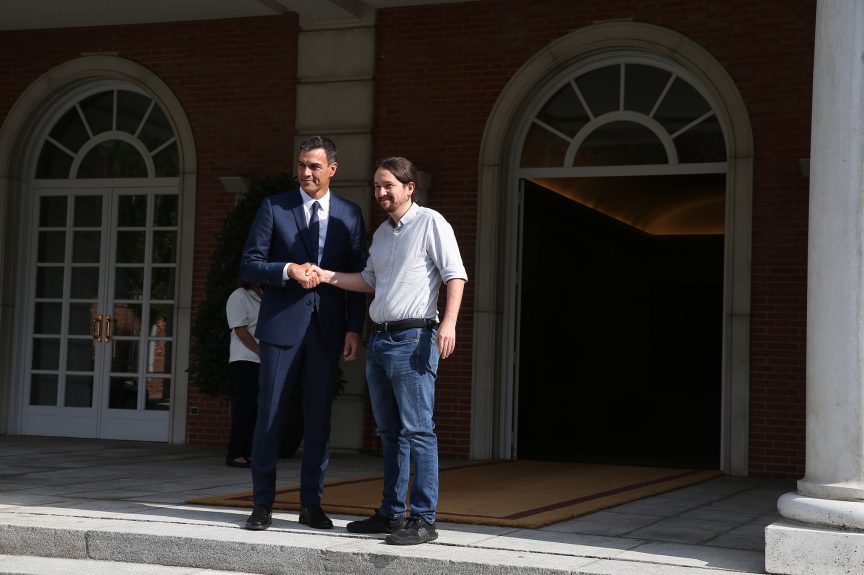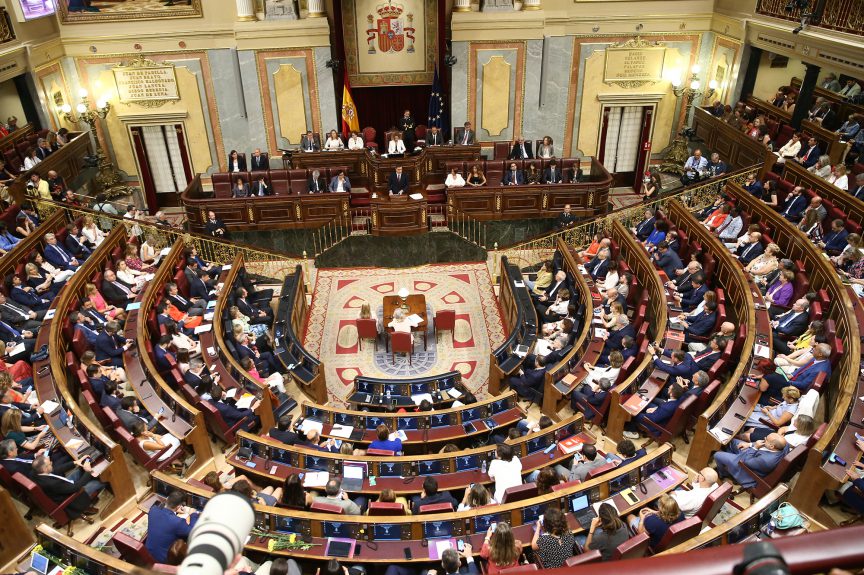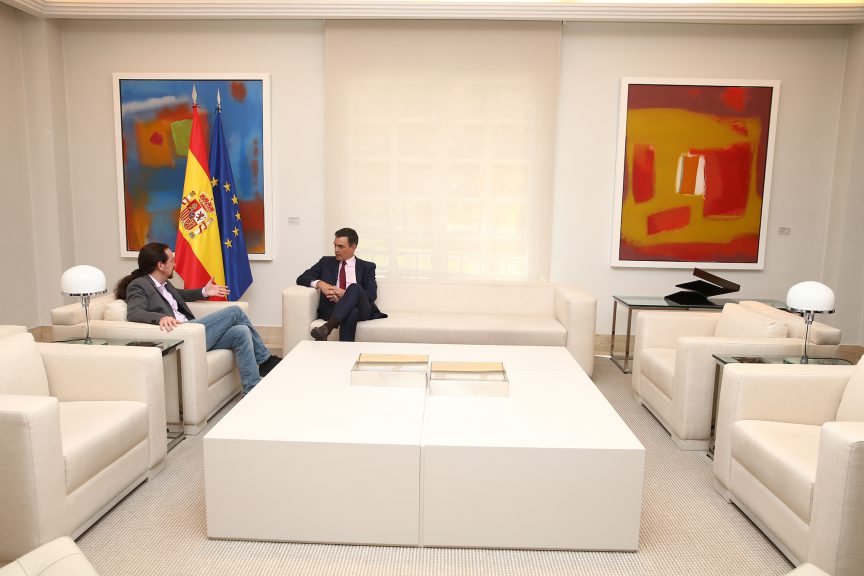
Four months have passed since a snap election in Spain and the country still has no permanent national government. Despite not winning a majority, acting Prime Minister Pedro Sánchez emerged the clear winner in the April ballot, yet last month he became the country’s first prime ministerial candidate in recent history to lose two investiture votes, having also failed to secure public backing in 2016.
Going into the summer, Sánchez’s centre-left Socialist Party (PSOE) and the younger left-wing grouping Unidas Podemos looked set to negotiate Spain’s first left coalition since the 1930s. Now, talks between the two parties have all but broken down. PSOE announced last month it would not negotiate further with the group it had called its “preferred partner”, and has been seeking the abstention of right-wing parties to avoid another general election being called in September – what would be the country’s fourth since December 2015.
How did things look after the election?

With 28% of the popular vote and 35% of total seats, Sánchez was in the driving seat going into government formation talks. But the momentum of the election has largely disappeared in the last four months. Despite welcoming a left-wing coalition in the days leading up to the ballot and placing a social agenda at the centre of his campaign, Sánchez quickly reverted to a triangulation strategy following the result, attempting to play the left and the right off against each other during negotiations, all the while decrying the “cordons sanitaires” (barriers) laid down by right-wing parties with respect to his prospective government.
He reiterated his criticism of the right a month later, with a pointed message to Albert Rivera’s liberal-rightist Ciudadanos (Citizens), which has come under sustained pressure from the Spanish media and finance sectors to join Sánchez in forming a centrist coalition.
Meanwhile, Sánchez’s main rival on the left, Podemos, lost over a third of its seats from 2016 and the insurgent far-right Vox party failed to make the dramatic breakthrough predicted of them (despite still obtaining 24 seats and 10% of the national vote). Yet it is this last party and its allies that will be most energised by recent events, relishing the prospect of repeat elections amid the backdrop of the autumn verdict and sentencing in the politically explosive Catalan trial.
Why did left-wing coalition talks break down?

From the outside looking in, it may seem difficult to grasp how the party-political coordinates and the national mood have shifted so considerably over the summer months. Why have government talks broken down so disastrously?
Firstly, local, regional and European elections in May changed the complexion of negotiations at the national level. As PSOE swept to victory across the board, thus consolidating its electoral resurgence, the results for Podemos left Pablo Iglesias’ party in a significantly weakened position going into summer talks, as affiliate groups and platforms it backed were removed from almost all of the major Spanish cities they had won in 2015.
When negotiations began in earnest this June, the talks quickly hit a wall. Having announced it would seek to govern alone, PSOE made a series of offers to Podemos that the latter claimed were insubstantial and insincere, accusing the centre-left force of acting in bad faith. One of the party’s co-founders, Juan Carlos Monedero, summed up PSOE’s supposedly superficial proposals in the following way:
“We have 30% of the seats [in a prospective coalition government] but PSOE considers that we should manage only 5% of its budget”.
PSOE’s engagement during these weeks comprised a number of purportedly unrealistic offers, slightly adjusted each time, while it waited for voices of dissent to grow inside Iglesias’ party and thus for his negotiating position to be weakened.
Is Sánchez’s strategy working?

Until July, Sánchez’s slow-game approach appeared to be working. On the one hand, he sought to bleed out the right – amid internal and external pressure on its two main established parties (including high-level resignations in Rivera’s group over his refusal to negotiate), the positions of both its leaders looked increasingly precarious. He pursued this strategy in the hope the conservative Popular Party (PP) might abstain or Ciudadanos might buckle under months of pressure and agree to a coalition, while at the same time he attempted to neutralise Podemos into a manageable position as a possible junior partner. For better or worse, the left-wing Podemos has been strategically committed to entering government as part of a formal coalition with its centre-left rival for a year now at least.
At the end of the month, the deadlock looked like it could finally break as Iglesias renounced any prospective post in a coalition government to help ensure a deal was secured. Sánchez had in previous days told an interviewer that the Podemos leader, who he had accused of intransigence and self-interest at the negotiating table in the past, was the “main stumbling block” in the talks. Iglesias’ move, made on the proviso that other leading MPs in his party would get substantial ministerial positions, ensured the ball was placed firmly in PSOE’s court.
After the failure to negotiate a left-wing coalition in 2016 – which impacted Podemos more negatively than it did PSOE, but nevertheless produced a generalised sense of disillusionment across the entire Spanish left – pressure settled on Sánchez to make the next move, since he had successfully painted Iglesias and Podemos as the obstructionist force at the heart of 2016’s failed talks.
Yet disagreements over the coalition’s composition brought talks to a grinding halt once again after Iglesias’ unexpected gambit. His party had made clear it would not pursue ‘ministries of State’ (such as defence, justice and foreign affairs), but would seek to influence social policy in areas like the labour and environment departments. However, PSOE accused Podemos of “want[ing] the [entire] government” and acting Deputy Prime Minister Carmen Calvo told its negotiators the party “could not have” the Labour Ministry portfolio it had targeted because it “unnerve[s] the CEOE [association of business leaders]” too much. Counter offers of a newly-created Housing Ministry without any clear competencies or funding and the Ministry of Health, the policy of which is largely determined by regional administrations, were predictably rejected.
What’s going to happen now?

The state of relations and a mutual sense of mistrust between the two parties seemed to be summed up, as tensions rose in the days leading up to the investiture vote, when the PSOE leadership leaked a doctored version of Podemos’ initial negotiating document (entitled “Podemos’ demands to the PSOE”). Podemos again abstained and with this a number of independents and regional nationalists (whose votes, which it may not be possible to count on in September, are also required for a left-wing government) withheld their support.
A CIS poll last month suggested voters would not punish Sánchez’s party at a repeat election, indicating it would receive up to 41.3% of the national vote – 11% higher than its result in April. Privately, however, he knows fresh elections in Spain’s volatile and fragmented political landscape would be a huge risk, after his high-stakes gamble in spring paid off better than even he could have anticipated. Meanwhile, for Podemos repeat elections could spell electoral disaster as it would in all likelihood face a struggle to mobilise the left vote in the wake of yet another failed coalition effort and as the political agenda turns back to the national question – terrain that is far more amenable to the right.
With this consideration in mind the United Left (an umbrella group formed out of the former Communist Party, and one part of Podemos’ electoral coalition) released a statement at the end of July calling for a programmatic agreement with PSOE rather than a formal coalition, while an affiliate group in Catalonia called for reconsideration. It has been suggested that United Left would refuse to run as part of the Podemos ticket again should new elections be called, yet it has since gone back to supporting Iglesias’ approach. The Spanish right, meanwhile, has refused to abstain citing Sánchez’s refusal to do the same in 2016 to facilitate a Rajoy minority government, the position that led to his removal from the PSOE in a palace coup later that year.
Following his second failed investiture vote, Sánchez vowed to get back to the negotiating table. Yet last week Podemos made a new offer for a government deal which was rejected by PSOE over differences regarding “questions of the state” including Catalonia. With the deadline for new elections only 4 weeks away, it is still not clear where a breakthrough will come from.
Sánchez’s intention appears to be to push negotiations down to the wire in the hope of an abstention or confidence and supply deal, amid the likely pressures and upheavals of September. His party underlined in its response last week that Podemos’ latest proposals “programmatically are very close [to something we could agree on]”. Yet neither Iglesias, nor the right, look ready to give in.
Tommy Greene is a journalist based in Spain. In addition to Novara Media, he writes for the Independent, Open Democracy, Jacobin and Tribune, among others.